As the afternoon rays cast through the glass window of her living room, Gloria Nawanyaga cranes her neck towards the wall clock.
“It is already 2 O’clock. It is medicine time,” says the 28-year-old as she reaches for a tin of tablets from a corner tray.
“I swallow one tablet every afternoon after food. It is now part of me,” she adds, beaming with a smile.
Nawanyaga has been the face of Uganda’s war against HIV stigma. In 2017, she was crowned the country’s Miss Y+ a beauty pageant run by young people for young people battling the virus.
However, the pageant found her on track. Nawanyaga started her positive living journey at birth.
“My mother disclosed it to me at eleven years. I remember her asking me, what do you know about HIV? And I told her that everyone who has HIV is going to die,” she relates.
They had made frequent visits to hospital, collecting medication, yet as a child, she never fully understood the reasons behind them.
“My mother asked me, what would you do if I was HIV positive … I tried to connect the dots of me taking medication, it’s when it occurred to me,” she narrates adding that “it is when I started to hate myself”.
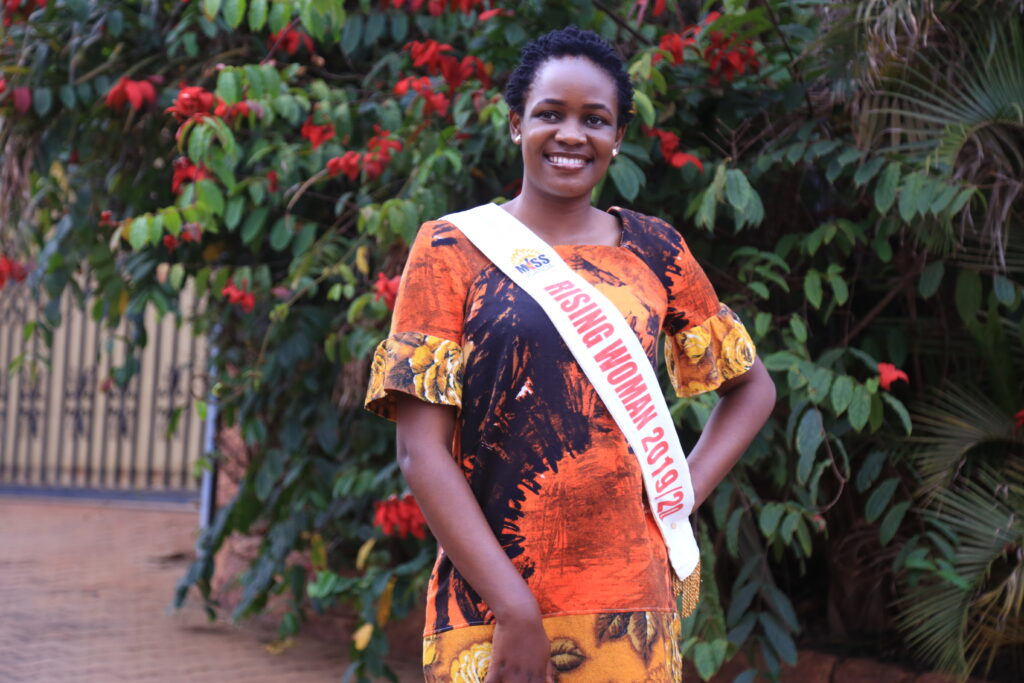
Gloria Niwanyaga pictured after sharing with Solutions Now Africa Team. PHOTO BY RICHARD MUGAMBE.
Many parents find the HIV/AIDs disclosure process difficult to initiate for children.
The Ugandan national policy guidelines require that children perinatally infected with HIV be told about their status by the age of 10 years. However, a combination of cultural and religious norms make it hard for most parents, and guardians.
This has complicated the disclosure process leading to few children above 10 years learning their HIV status.
According to the Ministry of Health, the absence of pre-and post-disclosure follow-up counseling leaves many children stressed with post disclosure psycho experiences.
For Niwanyaga, despite her feelings of resentment, she had no choice but to adapt. She also received support from home. However, she was never prepared for what lay ahead.
“So, when I joined the secondary school, there was a child of a neighbor who knew about my status. When he saw me, he influenced everyone not to associate with me, claiming that I would infect them with HIV. That was my first encounter with stigma,” she explains.
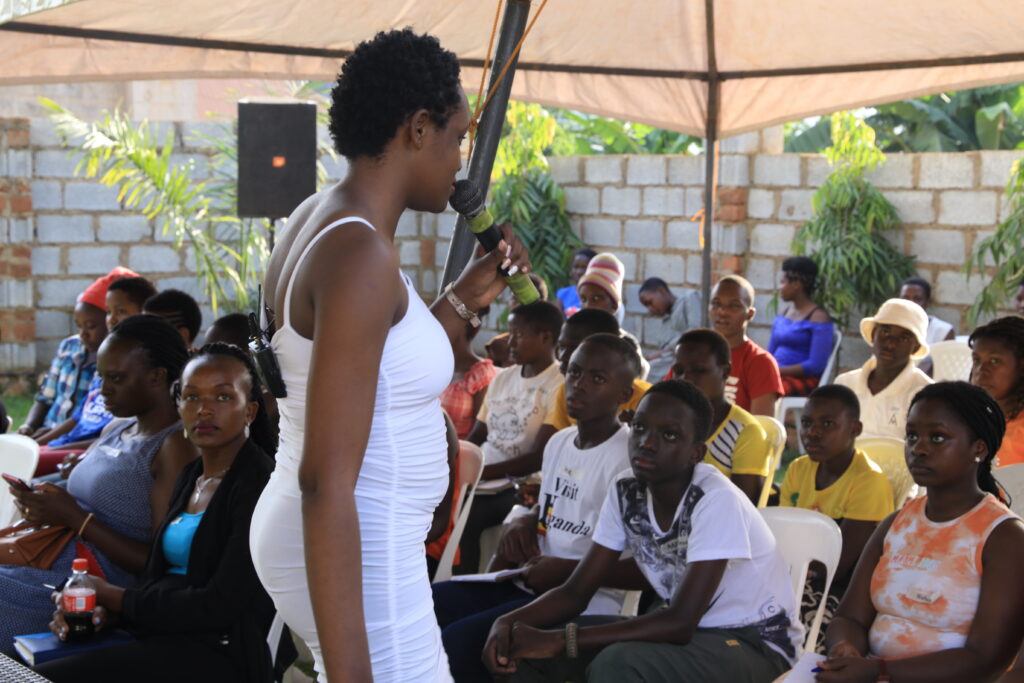
Gloria Niwanyaga pictured sharing with young people about the dangers of stigma during a community outreach outside Kampala. PHOTO BY EMMANUEL EGONU.
HIV STATUS Explained
The Uganda Aids Commission, an agency established by the government in 1992 to buffer efforts against the disease, estimates that about 1.4 million people are living with the Human Immunodeficiency Virus (HIV) in Uganda.
According to the World Health Organisation, HIV is spread to young people like Gloria through a variety of routes, including mother-to-child transmission, interchange of sexual contact, and exchange of bodily fluids like blood, semen, vaginal fluids, anal mucus, and breast milk.
As per the Uganda Population-Based HIV Impact Assessment survey, the virus is prevalent among the country’s young population, and so is discrimination.
It further indicates that HIV prevalence among young people aged 15 to 24 is 1.8%. In this age group, the prevalence is three times higher among women at 2.9% compared to men at 0.8%.

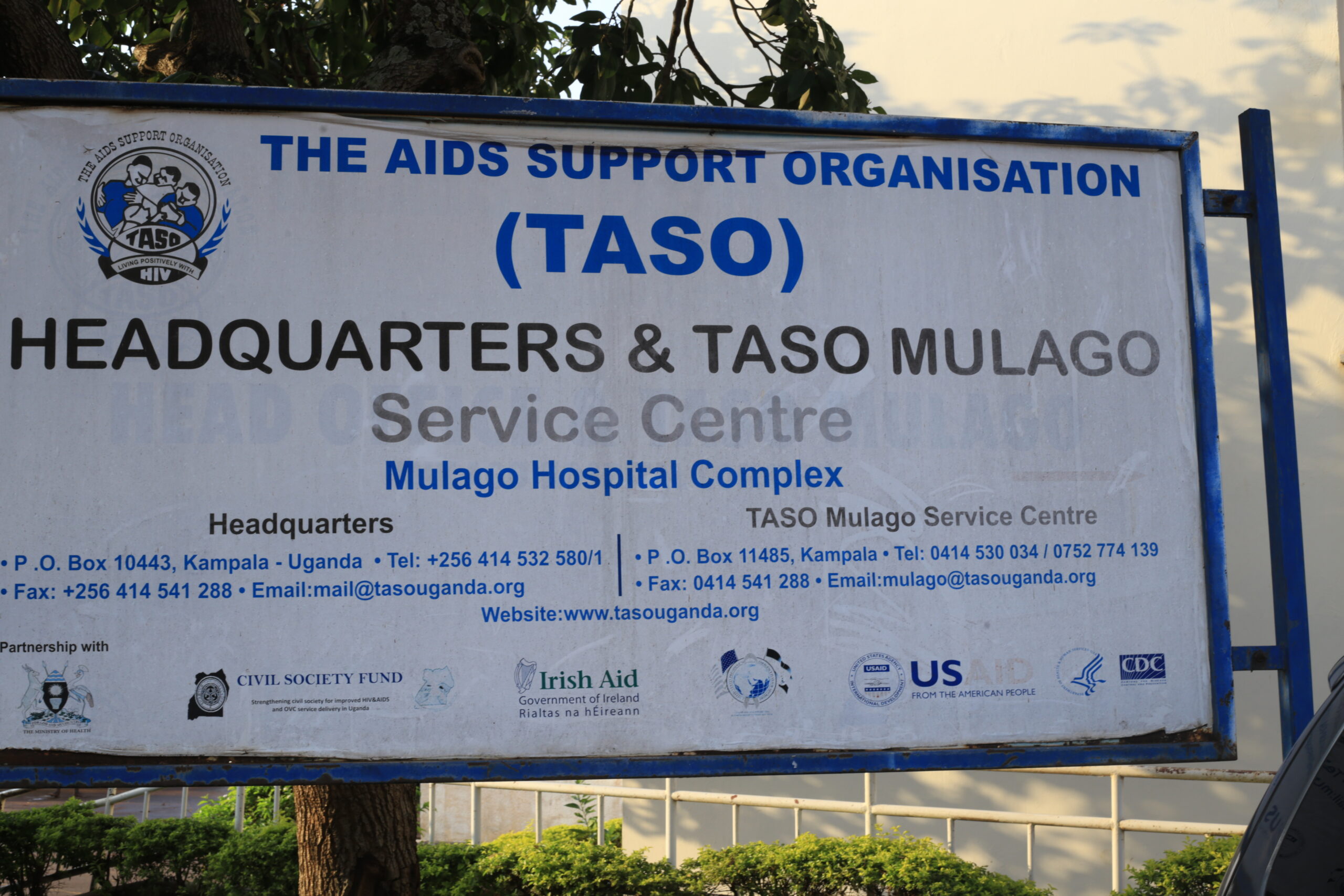

Dr. Yunus Miya, the Chief Programs and Capacity Development Officer at TASO, explains that young people tend to have a higher number of cases due to their more extroverted nature.
“Looking at this age group, they’re growing up, experimental, and energetic. They take risks a little, much more. And their risk perception of what they’re engaging in and what they’re doing is a little less compared to the older population, Miya explains.
While the government of Uganda has invested in HIV testing and prevention measures for the last two decades, statistics by Be in the Know show that HIV-related stigma remains an issue remains a major obstacle.
Experts say that stigmatizing attitudes are discouraging especially the young from adhering to treatment and adopting preventive measures.
“Stigma tends to cause negative emotions in the persons that are affected. And in so doing may cause a number of undesired behavior in them. They could become fearful, may isolate, and others in so doing others tend to pass on the virus to others,” explains Dr. Miya.
Gloria explains that during high school, she used to hide in order to take her medication so that she is not seen by other students.
“I used to wait for all the students to get out of the dormitory in order to swallow my ARVs,” she adds.
The psychological distress caused by HIV stigma cannot be underestimated.
According to Dr. Kimera Julius, a psychiatrist at Mulago Mental Health Department, stigma can have far-reaching consequences, not only on physical health but also on mental well-being.
“The intersection of HIV stigma and mental health is profound. Individuals who experience stigma may internalize feelings of shame, guilt, and self-blame. This can lead to increased stress, anxiety, and depression, impacting their overall mental health.”
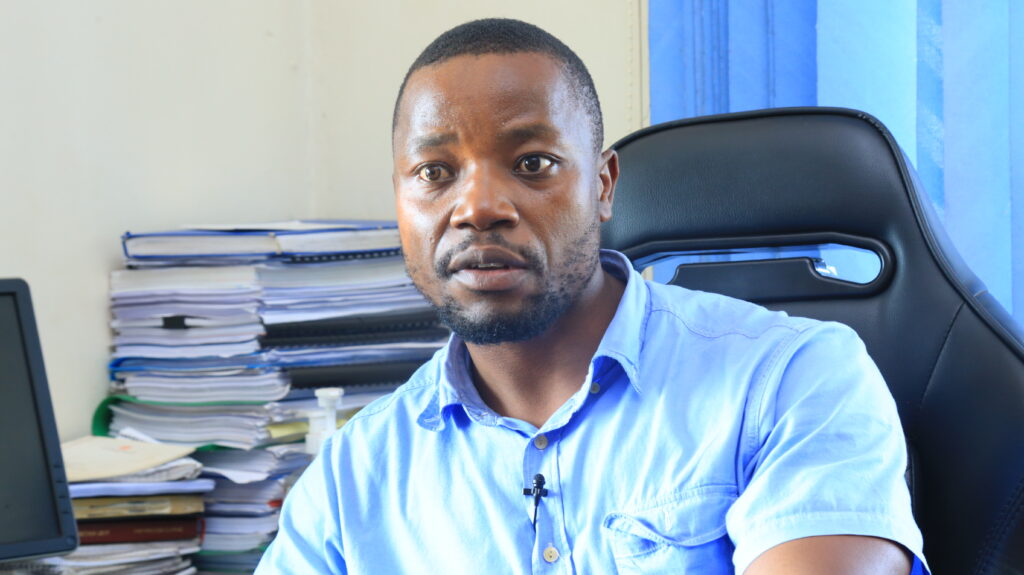
Dr. Yunus Miya, the Chief Programs and Capacity Development Officer at TASO Uganda speaks during an interview with Solutions Now Africa. PHOTO BY EPHRAIM BUKENYA.
Having realized a gap in bringing face to the virus, Uganda Network of Young People Living with HIV/AIDs (UNYPA), a youth-centered community organization, is engaging young people living with HIV in the country to put face to stigma.
This is through an annual Y+ beauty pageant, pinnacles of outstanding young men and women living with the virus, and grooming anti-stigma emissaries. Niwanyaga participated in the pageant in 2019, and was crowned.
“I had the zeal to prove to people that I can be successful in life. So one day I was in my room trying to check the internet in search of what a person living with HIV can do. That’s when I landed on the beauty pageant.” Gloria.
According to Isaac Lekdyang, the Executive Director at UNYPA, the pageant is a unique campaign model promoting beauty with “Zero discrimination”.
“The Y+ model turns around stigma into pride to promote inclusiveness and acceptability of HIV+ persons. It creates a platform of learning and showing communities their (inner) beauty, and therefore enabling young people living with HIV to become champions in the fight against stigma and discrimination,” Lekdyang explains.
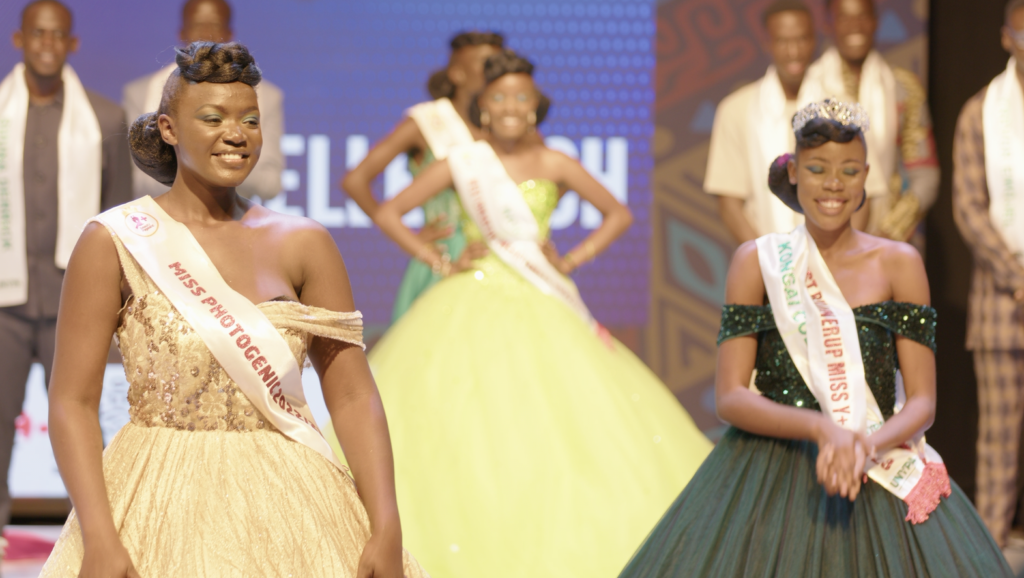
Contestants pictured during the Miss Y+ beauty contest. Courtesy Photo.
The group organizes community outreaches in different regions of the country, with the intention of sensitizing people about HIV.
In the process, young people doing work around positive living among their peers are identified to contest in the pageant, which helps them to accelerate their plans.
Following these auditions, victorious candidates from each region undergo a two-week boot camp, a period dedicated to empowering YLHIV. This involves bolstering self-confidence, addressing community-driven stigma, enhancing knowledge about HIV advocacy, and nurturing improved entrepreneurial skills.
“We empower them to advocate with evidence. And make them understand the impact of their actions in the community as role models. So I think that is, for me, the biggest achievement,” says Lekdyang.
The culmination is the grand finale, known as “D day,” which is a platform for combating HIV-associated stigma and discrimination.
During this stage, individuals are selected and crowned as Miss and Mr. Y+. Isaac underscores that the evaluation criteria are impartial and equitable for all participants.

Uganda’s 2022-2023 Mr. Y+ Faisal Katende flanked by friends at the pageant organized by Uganda Network of Young People Living With HIV in Kampala. Courtesy Photo
The Y+ Pageant began in 2014 and has had over 2000 young people in its competitions and fellowship program.
“The campaign has an enormously empowering effect on so many young people living with HIV. Not only those who participate but also those who watch from the sideline,” Lekdyang explains.
Beyond the pageant, UNYPA says it has reached 50240 YLHIV reached through its campaign and over 100,000 young people through other social media HIV-related campaigns.
Upon the conclusion of the three-month campaign, these ambassadors are entrusted to engage in diverse activities. These activities encompass community dialogues and participation in national events like World AIDS Day, both at the local and national levels.
“They empower us to advocate against stigma and discrimination and for the right people living with HIV. We advocate for safe spaces for people living with HIV and other, public health issues and social injustices, sexual, and productive health and rights,” Gloria says.
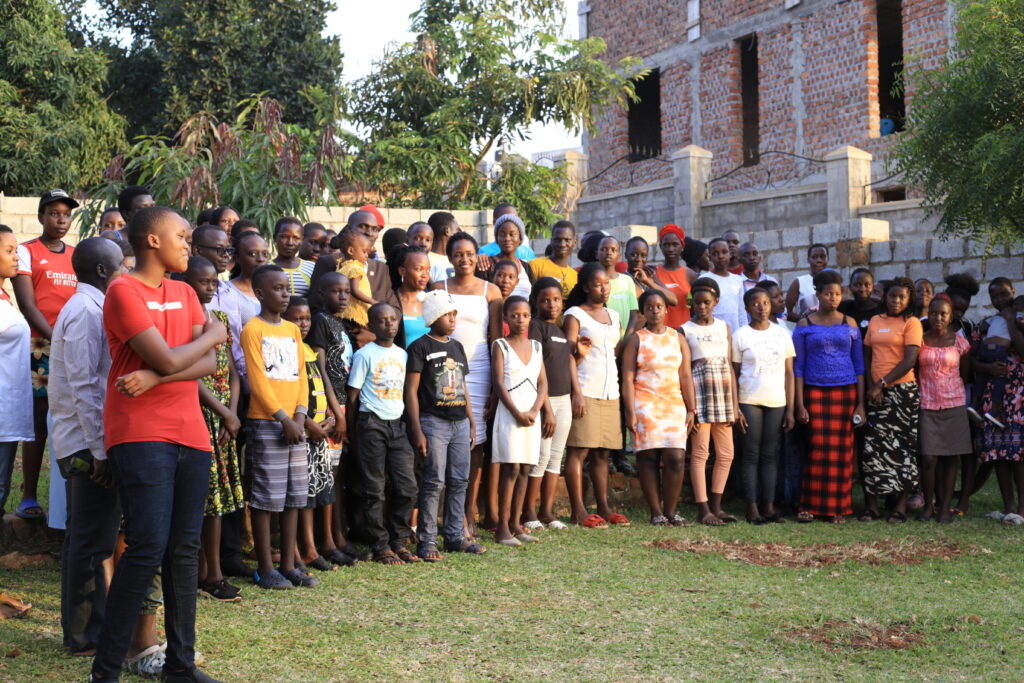
Community members take a joint photo with Gloria Niwanyaga after the anti-stigma sensitization workshop held in Kampala. PHOTO BY RICHARD MUGAMBE
Despite the empowerment that comes with the campaign, Uganda’s journey against stigma is still hindered by quite a number of social and structural challenges.
Just as misinformation and fake news manifested themselves during the covid-19 pandemic and undermined several efforts against the virus, Lekdyang notes that it has sowed seeds of animosity.
The young, who rely on the internet for sexual reproductive information are finding it hard to get the right facts.
“For many young people, their biggest sexual reproductive health need is information … Therefore, lacking support in terms of accurate information limits our impact and responses to the fight against stigma,” Lekdyang says.
Even with an ongoing stigma, young people like Gloria hold on to hope. They are confident that they are destined to rise against the tide.
Gloria served as a beacon of inspiration, challenging misconceptions. Her resilience underscores the significance of hope, even in difficult circumstances.
“When I go down to the communities, I always tell YLHIV three things. That is self-love, self-acceptance, and hope. You cannot go and control everyone in the world to like you,” she concludes.
Recent News
© 2022 - Media Challenge Initiative | All Rights Reserved .


